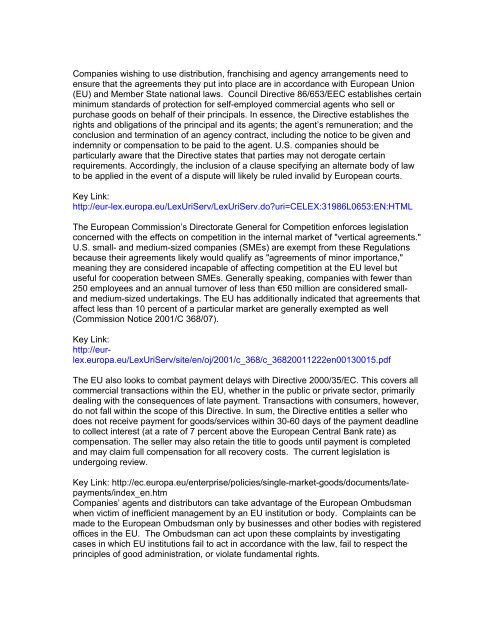Doing Business In - International Franchise Association
Doing Business In - International Franchise Association
Doing Business In - International Franchise Association
Create successful ePaper yourself
Turn your PDF publications into a flip-book with our unique Google optimized e-Paper software.
Companies wishing to use distribution, franchising and agency arrangements need to<br />
ensure that the agreements they put into place are in accordance with European Union<br />
(EU) and Member State national laws. Council Directive 86/653/EEC establishes certain<br />
minimum standards of protection for self-employed commercial agents who sell or<br />
purchase goods on behalf of their principals. <strong>In</strong> essence, the Directive establishes the<br />
rights and obligations of the principal and its agents; the agent’s remuneration; and the<br />
conclusion and termination of an agency contract, including the notice to be given and<br />
indemnity or compensation to be paid to the agent. U.S. companies should be<br />
particularly aware that the Directive states that parties may not derogate certain<br />
requirements. Accordingly, the inclusion of a clause specifying an alternate body of law<br />
to be applied in the event of a dispute will likely be ruled invalid by European courts.<br />
Key Link:<br />
http://eur-lex.europa.eu/LexUriServ/LexUriServ.do?uri=CELEX:31986L0653:EN:HTML<br />
The European Commission’s Directorate General for Competition enforces legislation<br />
concerned with the effects on competition in the internal market of "vertical agreements."<br />
U.S. small- and medium-sized companies (SMEs) are exempt from these Regulations<br />
because their agreements likely would qualify as "agreements of minor importance,"<br />
meaning they are considered incapable of affecting competition at the EU level but<br />
useful for cooperation between SMEs. Generally speaking, companies with fewer than<br />
250 employees and an annual turnover of less than €50 million are considered small-<br />
and medium-sized undertakings. The EU has additionally indicated that agreements that<br />
affect less than 10 percent of a particular market are generally exempted as well<br />
(Commission Notice 2001/C 368/07).<br />
Key Link:<br />
http://eurlex.europa.eu/LexUriServ/site/en/oj/2001/c_368/c_36820011222en00130015.pdf<br />
The EU also looks to combat payment delays with Directive 2000/35/EC. This covers all<br />
commercial transactions within the EU, whether in the public or private sector, primarily<br />
dealing with the consequences of late payment. Transactions with consumers, however,<br />
do not fall within the scope of this Directive. <strong>In</strong> sum, the Directive entitles a seller who<br />
does not receive payment for goods/services within 30-60 days of the payment deadline<br />
to collect interest (at a rate of 7 percent above the European Central Bank rate) as<br />
compensation. The seller may also retain the title to goods until payment is completed<br />
and may claim full compensation for all recovery costs. The current legislation is<br />
undergoing review.<br />
Key Link: http://ec.europa.eu/enterprise/policies/single-market-goods/documents/latepayments/index_en.htm<br />
Companies’ agents and distributors can take advantage of the European Ombudsman<br />
when victim of inefficient management by an EU institution or body. Complaints can be<br />
made to the European Ombudsman only by businesses and other bodies with registered<br />
offices in the EU. The Ombudsman can act upon these complaints by investigating<br />
cases in which EU institutions fail to act in accordance with the law, fail to respect the<br />
principles of good administration, or violate fundamental rights.

















